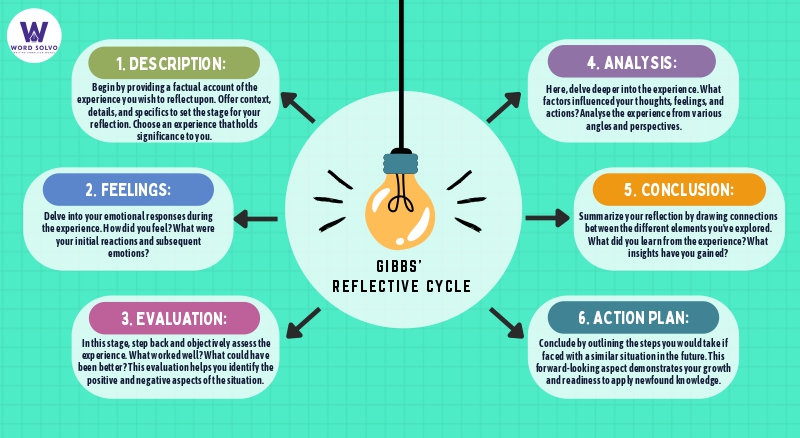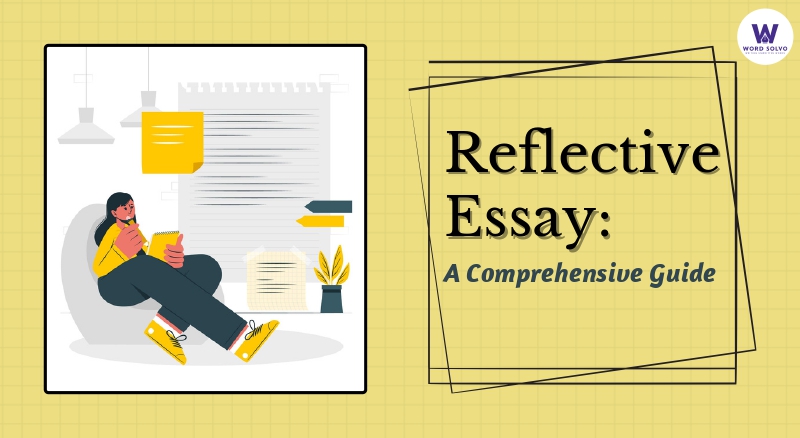A reflective essay is a personal essay that goes far beyond the traditional confines of academic writing in its tonality, and writing style. In the realm of academia and personal growth, the reflective essay stands as a unique and insightful genre that encourages introspection, self-discovery, and the articulation of one's thoughts and experiences.
In this blog, our experts at Word Solvo have decoded the very essence of reflective essay writing so that the next time you are given such assignments, you fear not to take the self-introspection journey that not only enriches your viewpoint but also prepares you for academic and professional success.
What is Reflective Essay Writing?
Reflective essay writing, at its core, is a canvas where an individual paints a vivid picture of the experiences, growth, and understanding of the self that might be used to enhance personal and professional learning.
However, reflective writing is not about narrative personal life events mindlessly and un-structurally as it would not serve the purpose of learning through reflection. For the most part of composing a reflective essay, the professors would ask you to use any reflective cycle to structure and present your composition.
What are the Popular Reflective Cycles used in Academic Writing?
Several reflective cycles are commonly used in academic writing to guide the process of self-reflection and the creation of reflective essays. These cycles provide structured frameworks to help individuals explore their experiences, emotions, and insights in a systematic manner. Gibbs’ reflective cycle, Kolb’s experiential learning cycle, Driscoll’s model, and John’s model of structural reflection are commonly used in reflective writing.
In this article, we are discussing Gibbs’ reflective cycle guide for helping you out with your reflective essay writing assignments.
Gibbs’ Reflective Cycle

Description: Begin by providing a factual account of the experience you wish to reflect upon. Offer context, details, and specifics to set the stage for your reflection. Choose an experience that holds significance to you. It could be an academic project, a personal encounter, or a professional challenge.
Feelings: Delve into your emotional responses during the experience. How did you feel? What were your initial reactions and subsequent emotions? If you are still confused, you can check out our reflective essay example Gibbs from here.
Evaluation: In this stage, step back and objectively assess the experience. What worked well? What could have been better? This evaluation helps you identify the positive and negative aspects of the situation.
Analysis: Here, delve deeper into the experience. What factors influenced your thoughts, feelings, and actions? Analyse the experience from various angles and perspectives. Check out our reflective essay example Gibbs for a better understanding.
Conclusion: Summarise your reflection by drawing connections between the different elements you've explored. What did you learn from the experience? What insights have you gained?
Action Plan: Conclude by outlining the steps you would take if faced with a similar situation in the future. This forward-looking aspect demonstrates your growth and readiness to apply newfound knowledge.
You can also browse for reflective essay examples Gibbs for having a better perspective and understanding. Our experts at Word Solvo also have attached a reflective essay example Gibbs in resources for helping you out.
Reflective Essay Introduction
A reflective essay is written in the first person as it is a personal account of learning from experiences. However, the elements of the reflective essay introduction remain the same.
For example, you have to guide the readers by explaining the roadmap and structure of the reflective essay just like any other piece of academic writing. However, keep in mind that the whole piece of writing of your reflective essay introduction needs to be in the first person.
Crafting the Main Body for the Reflective Essay
The main body describes and critically analyses your process of learning. Hence, you need to implement a learning cycle like the ones mentioned above to explain the way you learned something.
For example, to explain the way you learned the importance of empathy in the workplace, you might use Gibbs’ reflective cycle. You can also refer to the reflective essay example Gibbs crafted by our experts for better understanding.
Give subheadings for the stages of the reflective cycle for better structuring and formatting the essay. However, many professors do not want subheadings in an essay. In such cases, you might want to describe and apply each stage in different paragraphs. Check out our reflective essay example Gibbs if you feel confused while composing your reflective essay writing.
The Conclusion
Writing the conclusion of a reflective essay is just like composing a conclusion for any other academic work. However, it needs to be kept in mind that the writing must be presented using the first person, just like the reflective essay introduction and the main body.
In a world that often urges us to rush forward, the reflective essay encourages us to pause and look inward. It's a form of writing that transforms experiences into wisdom, challenges into growth, and emotions into eloquence. As we delve into the art of crafting reflective essays, we unlock a world where words become vessels of insight and introspection. Hence, reflective essay writing is gaining prominent importance in effective writing as a tool for developing individuals’ personal and professional effectiveness.
If you feel any confusion while reading this guide or writing your own piece, feel free to contact us. Our experts are at your service always to make your academic journey as smooth as it can be!

